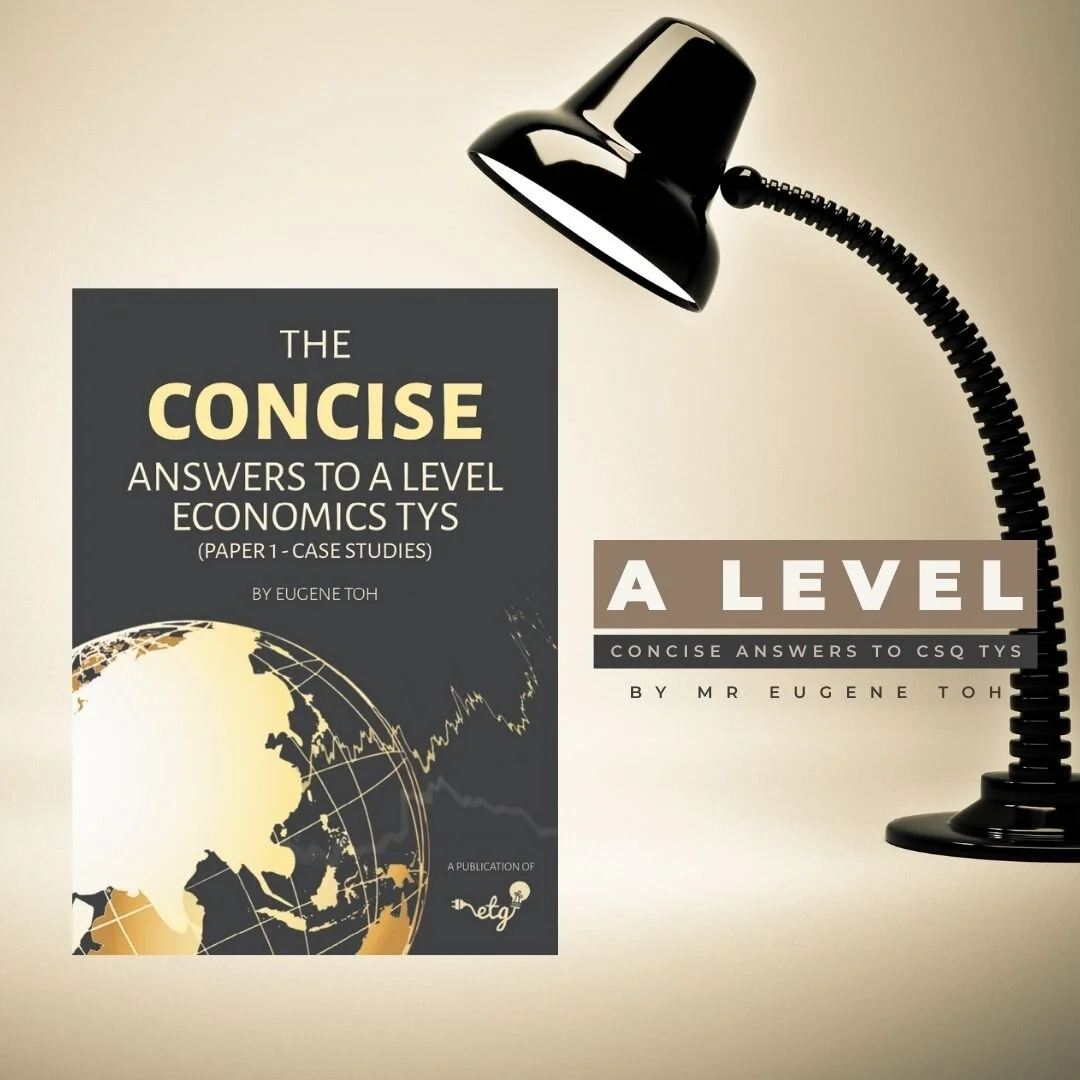(2015) A Level H2 Econs CSQ 2 Suggested Answers by Mr Eugene Toh (A Level Economics Tutor)
(2015) A Level H2 Econs Paper 1 CSQ Q2
Suggested Answers Outline
a. EU’s trade deficit with China worsened from 140 billion euros to 146 billion euros
b. Protectionism refers to the deliberate act of erecting trade barriers to restrict or penalise the inflow of imported goods, usually to protect domestic industries. Examples of such trade barriers can include tariffs, quotas & administrative barriers.
c. “Dumping” is the act of selling goods in the international market at a price that is considered to be below the market price or even cost price.
Subsidies that the Chinese government gives to solar panel producers could lower the cost of production which shifts the supply of solar panels from SS0 to SS1.
This will bring down the price of solar panels from P0 to P1.
If such an act was what pushed down prices to below market prices, it could be claimed that the subsidies allowed the Chinese to dump solar panels in the EU market.
d. An agreed minimum price would in practice work the same way that a price floor does.
An effective minimum price (Pmin) will be set to be above the current equilibrium price (P0)
At a higher price, quantity demanded for the good will fall from Q0 to Qd while the quantity supplied for the good will increase from Q0 to Qs.
This will create a surplus for the solar panels which will be unsustainable unless the government buys up the surplus (which is not a certainty, and there are also opportunity costs associated with such a government purchase).
A roll-back of the alleged subsidies can shift supply curve from SS0 to SS1 and this could allow the new market equilibrium price to be sustainable.
e. Assessment of ‘tariff’
1. Explain how tariff works (with diagram, subject to time constraints) and can make imported goods more expensive, thus making domestic substitutes relatively more ‘competitively priced’
2. Discuss how a tariff will likely invite retaliation, possibly triggering a trade war, negating any potential benefits brought about by a tariff
Assessment of ‘weaker’ exchange rate
1. A ‘weaker’ exchange rate will make a country’s exports cheaper and more competitively priced.
2. At the same time however, it could also bring about imported and imported cost-push inflation which can raise cost of production, possibly negating the effects that the ‘cheaper’ currency has on the prices of exports (bring in Singapore as an example).
Comparison, evaluation & conclusion
1. Both tariffs and ‘weaker’ exchange rates can invite retaliation, although the likelihood is less for exchange rate manipulation.
2. Both policies are not actually ideal in addressing loss in competitiveness – better to consider supply-side policies to improve either quality or price competitiveness of exports.
f. Note: Discussion needs to be framed in context of consumers, employees and producers
Impact of Escalating Trade Wars
Consumers
1. Tariffs will increase prices of imported goods and also force consumers to buy more expensive domestically produced substitutes
2. Protectionist measures will also result in less choices for consumers
Lack substantive benefits to consumers
Employees
1. When locals switch to buying domestically produced goods, demand for labour increases, reducing unemployment à benefit employees
1. When trade wars result in similar tariffs slapped back into the country’s exports, demand for goods & services may fall resulting in a fall in demand for labour à causing unemployment to worsen
Producers
1. Firms protected from foreign competition may experience a short term rise in profitability due to rise in demand for their goods & services
1. Producers importing raw materials affected by tariffs will experience an increase in cost of production à this impacts profitability and may affect their competitiveness
Conclusion
It would seem that, on balance, protectionism is a really bad idea in general and should be discouraged.
Book a Gaps & Competencies Assessment to find out
What are problems in your essay-writing
Which specific skill you are lacking to answer case study questions
What gaps do you have in understanding key concepts
Which topics are you weaker in
The Gaps & Competencies Assessment is 45 minutes long and is a 1-1 consultation with Mr Eugene Toh. At the end of the assessment you will also receive a report outlining your issues. You will also receive a FREE copy of our A Level Concise TYS Answers (CSQ)
Simply click here to book an assessment and our administrators will follow up with you within 24 hours. A diagnostic test will be sent for your to attempt at your own time prior to the Assessment.
Price of the 45 mins assessment: $15 (U/P: $90)
Found our TYS answers useful?
Maximise your A-Level H2 Economics preparation with the ETG A-Level H2 Economics TYS Crashcourse! Perfect for students looking to enhance their skills in both essay and case study analysis, this comprehensive 3-day crashcourse will cover over 60 essay questions and 20 case studies from the A-Level Economics Ten-Year Series. Whether you're attending onsite or via Zoom, our experienced tutors will guide you through the intricate demands of H2 Economics, offering expert feedback and graded answers. For the best economics tuition in Singapore, sign up now to secure one of the limited onsite seats!

